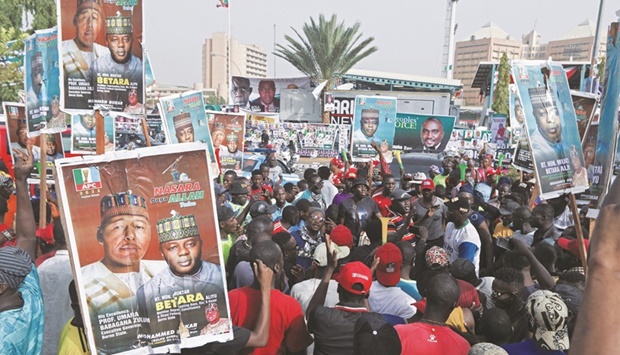Nigeria’s ruling party held its national convention yesterday to choose a new chairman and overcome infighting before picking a candidate to replace President Muhammadu Buhari in the 2023 election.
Thousands of delegates and supporters packed into a main square in the capital Abuja, where the APC will look to end internal bickering that Buhari warned could destroy party unity and its success in the vote.
Political manoeuvring is heating up to replace Buhari as leader of Africa’s most populous nation but the race remains open with several heavyweights in the running. All Progressives Congress (APC) party leaders and delegates will select a new chairman and other posts in a final stage before primaries later this year for a presidential candidate.
Drums and music accompanied rival groups of APC supporters, many clad in traditional wear bearing prints of their candidates for party positions, as they packed into Abuja’s Eagle Square. Buhari, a former army commander who steps down after two terms, spent weeks talking to the party’s state governors and senior members to try to reach a consensus on leadership before yesterday’s assembly.
“Ensure that we go into this election united so we can win this election, I think this has been the message as far as the president is concerned,” Abdullahi Sule, a state governor and senior APC member told local Channels TV.
Formed in an alliance of several parties in 2013, the APC managed to win in 2015 over the long-ruling People’s Democratic Party (PDP), which at the time was struggling with its own internal splits.
Buhari, who came to power promising to bring security and fight corruption, steps down touting successes in infrastructure and transport projects across the country.
But Nigeria is still battling militants in its northeast and its northwest region has been hit hard by criminal gangs behind a spate of attacks and mass kidnappings. Africa’s largest economy and top petroleum producer is recovering from the coronavirus pandemic, but recent fuel and electricity shortages have underlined cost-of-living woes for Nigerians.
How the APC manages unity in its convention will determine whether it will struggle with further splits and high-profile defections before primaries and 2023, analysts said.
“The outcome of the convention will either make or mar the party. We are aware of the bickerings, intrigues and horse tradings going on among the different groups,” said Dr Dapo Thomas, a political science lecturer at Lagos University.
“If the party is able to pull through a successful and rancour-free convention, then it will be a strong position to the battle ahead.”
Several presidential candidates have already made their ambitions known, including former Lagos State governor and APC strongman Bola Tinubu, and opposition PDP stalwart and former vice president Atiku Abubakar. At yesterday’s convention, some APC supporters brandished signs supporting the much-anticipated candidacy of Vice President Yemi Osinbajo, who has yet to announce any run, and for Tinubu, who already told Buhari he plans to compete.
“He’s coming through. He is the one who can change the situation in Nigeria for us,” said Eze, a Tinubu supporter decked out in a green tunic and pants printed with the smiling face of the former Lagos governor.
Under an unwritten agreement among elites, Nigeria’s presidency is expected to rotate between a candidate from the north and the predominantly Christian south.
The deal is aimed at keeping balance in country with more than 250 ethnic groups and where intercommunal tensions often flare up.
After two terms with Buhari from the north, many southern leaders are pushing for the presidency to return to a candidate from their region.

Supporters of Nigeria’s All Progressive Congress demonstrate at the Eagle square, in Abuja, yesterday.
